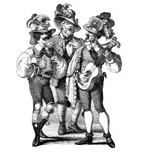
The Theology of Dance
GUEST COLUMN
There are over thirty references to dance and dancing in the Bible. Dancing is always an expression of delight, though not always an expression of God’s pleasure. When the Jews flee Egypt and are safely removed from the grip of Pharaoh, Miriam utters the first scriptural song of verse and rejoices by dancing with timbrel in hand. All too soon this dancing in God’s joy gives way to dancing before the idol of the golden calf. Centuries later, King David astounds and delights with his victory dance into conquered Jerusalem. Centuries after that comes the haunting contrast of Isaiah’s vision of satyrs dancing in fallen Babylon.
Since biblical times, traditional and folk dancing have codified forms of communal dancing. Mazurkas, Morris dancing, and Yiddish dancing are examples of dances to celebrate marriage and feast days in a manner that gives rise to the joy of the occasion without excess sensuality. These types of communal dancing preserve a truly human activity for the good of the whole without veering into prurience.
More recently, we have seen the development of partner dancing — ballroom, Latin, swing, and country, to name a few. Partner dancing exists between the extremes of erotic dancing on the one hand and communal dancing on the other. Though it is sensuous, it has strict rules and formats. If we stop to consider partner dancing, it offers insights into the relationship between men and women. In fact, partner dancing gives artistic expression to a primal, foundational relationship: God created man in His own image, male and female he created them.
For the newcomer to partner dancing, it can be jarring to learn that men always lead and women always follow. The cultural ether in which we move offers no clue that modern women heartily submit to this condition. In the tired jargon of our day, one would think it is profoundly sexist. Yet the terms for violating this rule, “back leading” and “hijacking,” speak to its strong proscription.
You May Also Enjoy
Mary was female, and if the Holy Spirit is female or feminine, then Jesus had two mommies, and presto "gay" is good.
Unsolicited conversations often turn into sermonettes, confrontations, or inquisitions if this is not the “blessed” first child.
Many, many priests and bishops knew Theodore McCarrick was a serial molester and yet, somehow, McCarrick got the ultimate appointment to the Archdiocese of Washington D.C., and was elevated to the rank of cardinal.

